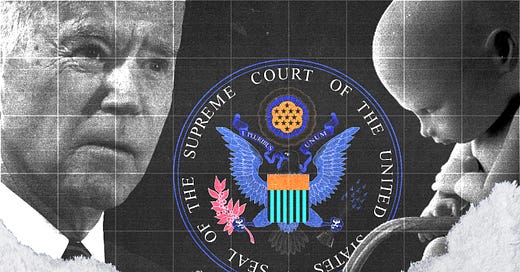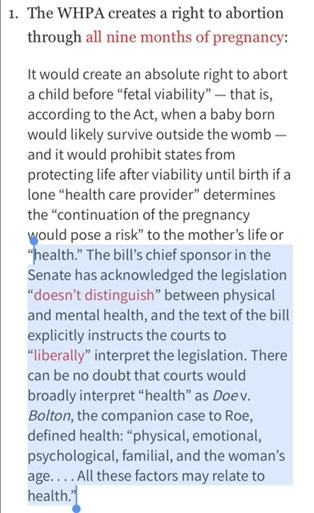Key moments in the EMTALA Supreme Court case
Federal law requires emergency care for both patients -- pregnant women and their unborn children.
On Wednesday, the Supreme Court heard the Biden administration try to explain why ER doctors should be forced to perform abortions that would violate state law. Audio and transcript are available online.
Ahead of the oral arguments, SBA’s State Public Affairs Director Kelsey Pritchard dismantled three lies that confuse doctors and endanger women’s lives:
Our team was listening for all two hours. Here are some of the key moments:
Justice Sotomayor “bungles” state pro-life laws
We couldn’t sum up this moment more perfectly than The Washington Times did. Sotomayor alleged there are some pro-life states that don’t make an exception to save the life of the mother. She did not name them, of course, because – as State Policy Director Katie Daniel points out in a Washington Examiner op-ed – it is completely false.
Joshua Turner, arguing for Idaho, politely debunked this nonsense:
“What you’re saying is that no state in the nation — and there are some right now that don’t even have that as an exception to their anti-abortion laws — what you’re saying is there is no federal law on the books that prohibits any state from saying even if a woman will die you cannot perform an abortion,” she said.
“I know of no state that doesn’t include a life-saving exception,” Mr. Turner replied.
“Some have been debating it at least,” Justice Sotomayor said.
No, Justice Sotomayor. They are not.
Abortion is like insulin?
Is mandating abortion – which ends the life of a human being – really no different from requiring insulin to treat diabetes? Sotomayor evidently thinks so:
Medically accepted – objective medically accepted standards of care require the treatment of diabetics with insulin. The medically accepted obligation of doctors when they have women with certain conditions that may not result in death but more than likely will result in very serious medical conditions, including blindness for some, for others, the loss of organs, for some, chronic blood strokes, Idaho is saying, unless the doctor can say in good faith that this person's death is likely, as opposed to serious illness, they can't perform the abortion.
We’re betting plenty of Americans who rely on insulin find this comparison deeply offensive – but the Court’s liberals seemed to be searching for any hypothetical case to wedge existing, thoughtfully designed exceptions wide open.
Justice Gorsuch: What about the unborn child?
Many observers noticed that the Court’s left-wing justices wanted to talk – a lot – about anything except the unborn child, who is referenced specifically in the EMTALA statute.
Almost 40 minutes into oral arguments, the first mention of the unborn child came at last from Justice Gorsuch:
And then what do we do with EMTALA's definition of “individual” to include both the woman and, as the statute says, the unborn child?
Turner replied:
The definition of “emergency medical condition” requires care when the child itself has an emergency medical condition regardless of what's going on with the mother. And so it would be a strange thing for Congress to have regard for the unborn child and yet also be mandating termination of unborn children.
Justice Alito: Why are we still ignoring the unborn child?
After about another hour, Alito reminded the Court once again that there are two patients involved in the EMTALA discussion. Solicitor General Elizabeth Prelogar’s response not only characterized the inclusion of the baby as merely an expansion of protections for pregnant women – she couldn’t even bring herself to use the words “unborn child,” which are right in the statute.
Listen to this pivotal exchange:
Delivery, not late-term abortion, is the standard of care
Democrats and the media frame late-term abortion as something that never happens except in dire circumstances – and must never be limited under any circumstances.
On X, reporter John McCormack points out, “Congressional Democrats’ federal abortion legislation [the grossly misnamed Women’s Health Protection Act] includes a post-viability health exception—not limited to physical health.”
But Prelogar shot a big hole in the Democrats’ argument:
There can be complications that happen after viability, but there, the standard of care is to deliver the baby if you need the pregnancy to end because it’s causing these severe health consequences for the mom.
Biden admin admits abortion for mental health is “incredibly unethical”
Abortion advocates won’t be happy. After they have spent months complaining that the lack of such loopholes in state laws and/or ballot initiatives is “cruel and will lead to the suffering deaths of pregnant women in these states,” causes stigma, and discriminates against “pregnant and postpartum people,” Prelogar – arguing on behalf of the federal government, believe it or not – stated clearly that abortion isn’t a treatment for mental health crises:
There can be grave mental health emergencies, but EMTALA could never require pregnancy termination as the stabilizing care…because that wouldn't do anything to address the underlying brain chemistry issue that's causing the mental health emergency in the first place. This is not about mental health generally. This is about treatment by ER doctors in an emergency room. And when a woman comes in with some grave mental health emergency, if she happens to be pregnant, it would be incredibly unethical to terminate her pregnancy. She might not be in a position to give any informed consent. Instead, the way you treat mental health emergency is to address what's happening in the brain.
She’s not wrong. There is no evidence abortion improves mental health outcomes for women. There is evidence that, at least for some women, abortion contributes to mental health problems such as PTSD, substance abuse and increased risk of suicide.
What’s next?
Charlotte Lozier Institute’s Dr. Ingrid Skop, a practicing Texas OB-GYN, shared her view of the case on Morning Wire.
The Supreme Court will have to decide on EMTALA and mail-order abortion drugs by around the end of June. Between these two cases and the coming election, life issues will not be out of the limelight any time soon.






